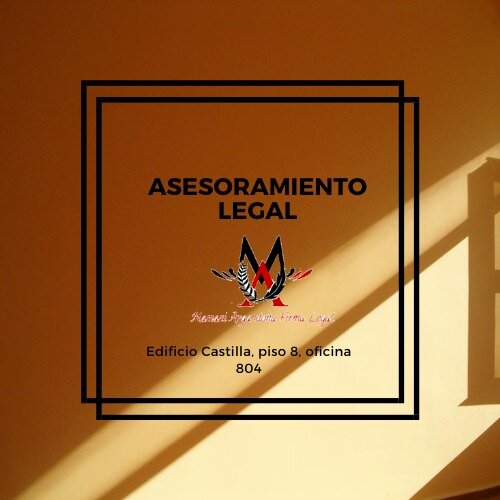Best Energy, Environment & ESG Lawyers in La Paz
Share your needs with us, get contacted by law firms.
Free. Takes 2 min.
List of the best lawyers in La Paz, Bolivia
About Energy, Environment & ESG Law in La Paz, Bolivia
Energy, Environment, and ESG (Environmental, Social, and Governance) law in La Paz, Bolivia, governs how individuals, companies, and the government interact with the environment and energy resources, and how they manage their impact on communities and stakeholders. La Paz, as the administrative capital of Bolivia, is central to the development and enforcement of regulations surrounding mining, oil and gas, renewable energy, environmental protection, and social responsibility. These laws are designed not only to regulate the extraction and use of resources but also to promote sustainable development, protect indigenous rights, ensure fair labor practices, and enforce transparency in business operations.
Why You May Need a Lawyer
Legal issues involving energy, environment, and ESG can be complex and far-reaching in Bolivia. You may need a lawyer if you are:
- Launching an energy project, such as a mining operation or renewable energy installation.
- Facing environmental compliance issues or inspections from government agencies.
- Needing guidance on obtaining environmental licenses or permits.
- Involved in disputes over land use, resource extraction, or indigenous community rights.
- Seeking to understand and comply with ESG reporting requirements for your business.
- Defending yourself or your business against claims of environmental damage or regulatory breaches.
- Planning to invest in or acquire an energy or natural resource company in Bolivia.
- Interacting with Bolivian authorities or local communities on resource-related matters.
Having a lawyer ensures you navigate the regulatory environment correctly, comply with local laws, and protect your interests in complex transactions or disputes.
Local Laws Overview
Bolivia has a robust legal framework governing energy, environment, and ESG standards, much of which is coordinated from its political center in La Paz. Some key elements include:
- Bolivian Constitution: Recognizes the rights of Mother Earth and establishes state control over natural resources, giving special protection to indigenous and campesino communities.
- Law of the Rights of Mother Earth (Ley de Derechos de la Madre Tierra): Grants legal rights to the natural environment and outlines duties for protection and sustainable development.
- Environmental Law (Ley del Medio Ambiente): Sets standards for emission controls, waste management, and environmental licensing for projects impacting air, water, or land.
- Hydrocarbons Law and Mining Law: Regulate exploration and exploitation of oil, gas, and minerals, including social consultation, environmental impact assessments, and royalties.
- Renewable Energy Policies: Encourage investment and development of solar, wind, and hydroelectric projects with specific requirements on sustainability and community benefit.
- ESG Reporting: While not as established as in some countries, ESG principles are integrated into some government procurement and foreign investment processes, especially where international standards apply.
Failure to comply with these laws can result in fines, revocation of licenses, civil suits, and even criminal charges. Regulations also require meaningful consultation with local and indigenous communities for many projects.
Frequently Asked Questions
What government agencies oversee energy, environment, and ESG compliance in La Paz?
Key authorities include the Ministry of Environment and Water (MMAyA), the Ministry of Hydrocarbons and Energies, and the Autoridad Jurisdiccional Administrativa Minera (AJAM). Local governments in La Paz also play a role in enforcement.
What is an Environmental Impact Assessment (EIA) and when do I need one?
An EIA is a formal study evaluating how a project could affect the environment. It is required for most large-scale or potentially polluting activities, such as mining, road construction, and industrial installations, before work can begin.
How are indigenous community rights protected in energy and mining projects?
Bolivian law mandates prior consultation with affected indigenous peoples, respect for their customs, and their participation in decision-making for projects on their lands. Ignoring this process can lead to legal challenges or project suspension.
Are there incentives for renewable energy development?
Yes, Bolivia offers certain legal incentives and streamlined processes for solar, wind, and hydroelectric projects, although access to these incentives may depend on compliance with strict environmental and social criteria.
What are the penalties for violating environmental laws in Bolivia?
Penalties include significant fines, suspension or revocation of operating permits, restoration orders, and possible criminal prosecution for severe offenses.
Do ESG laws apply to foreign companies in Bolivia?
Foreign companies must comply with the same energy and environmental regulations as Bolivian firms when operating within Bolivia. ESG practices may also influence their ability to secure financing or government contracts.
Can individuals or communities file complaints about environmental harm?
Yes, communities, organizations, and individuals have the right to report environmental violations, and the government is required to investigate and take appropriate action.
What types of permits are needed for energy projects?
Typically, projects require an environmental license, sector-specific operational permits (e.g., mining or hydrocarbons), and sometimes water rights authorizations. The type of permit varies by project type and location.
Is water resource management regulated?
Yes, integrated water management is a central part of Bolivia’s environmental laws. Water use for energy or industrial purposes often requires prior approval and permits, especially in La Paz’s sensitive highland areas.
What should I do if facing a dispute over land or environmental harm?
It’s best to consult a lawyer experienced in environmental or resource law. Legal routes might include negotiation, administrative appeals, or court action, depending on the issue.
Additional Resources
The following organizations and authorities can help with guidance or information about Energy, Environment, and ESG law in La Paz, Bolivia:
- Ministry of Environment and Water (Ministerio de Medio Ambiente y Agua, MMAyA)
- Ministry of Hydrocarbons and Energies (Ministerio de Hidrocarburos y Energías)
- Autoridad Jurisdiccional Administrativa Minera (AJAM)
- Autoridad de Fiscalización y Control Social de Electricidad (AE)
- Defensoría del Pueblo
- Local environmental NGOs and legal aid organizations specializing in indigenous rights and environmental law
- Chambers of commerce and sector associations for energy and mining
These resources can provide initial information, forms, and advice on how to proceed with your legal issue.
Next Steps
If you believe you need legal assistance involving energy, environmental, or ESG matters in La Paz, Bolivia, consider the following steps:
- Gather all relevant documentation, such as permits, licenses, contracts, and official notices.
- Identify the main issue you are facing and any deadlines or urgent matters.
- Consult with a lawyer specializing in energy, environmental, or ESG law who is familiar with local and national regulations.
- Contact relevant government authorities if you need forms or official information before meeting with a lawyer.
- Engage with local community organizations if your matter involves indigenous or social impact concerns.
- Consider mediation or administrative processes before proceeding to court, depending on the nature of your dispute.
Proper legal guidance is crucial to ensure compliance with Bolivian law, protect your rights, and resolve conflicts efficiently. Seeking early advice from a qualified legal professional will help you avoid costly mistakes and achieve the best outcome for your case.
Lawzana helps you find the best lawyers and law firms in La Paz through a curated and pre-screened list of qualified legal professionals. Our platform offers rankings and detailed profiles of attorneys and law firms, allowing you to compare based on practice areas, including Energy, Environment & ESG, experience, and client feedback.
Each profile includes a description of the firm's areas of practice, client reviews, team members and partners, year of establishment, spoken languages, office locations, contact information, social media presence, and any published articles or resources. Most firms on our platform speak English and are experienced in both local and international legal matters.
Get a quote from top-rated law firms in La Paz, Bolivia — quickly, securely, and without unnecessary hassle.
Disclaimer:
The information provided on this page is for general informational purposes only and does not constitute legal advice. While we strive to ensure the accuracy and relevance of the content, legal information may change over time, and interpretations of the law can vary. You should always consult with a qualified legal professional for advice specific to your situation.
We disclaim all liability for actions taken or not taken based on the content of this page. If you believe any information is incorrect or outdated, please contact us, and we will review and update it where appropriate.
Browse energy, environment & esg law firms by service in La Paz, Bolivia
La Paz, Bolivia Attorneys in related practice areas.








